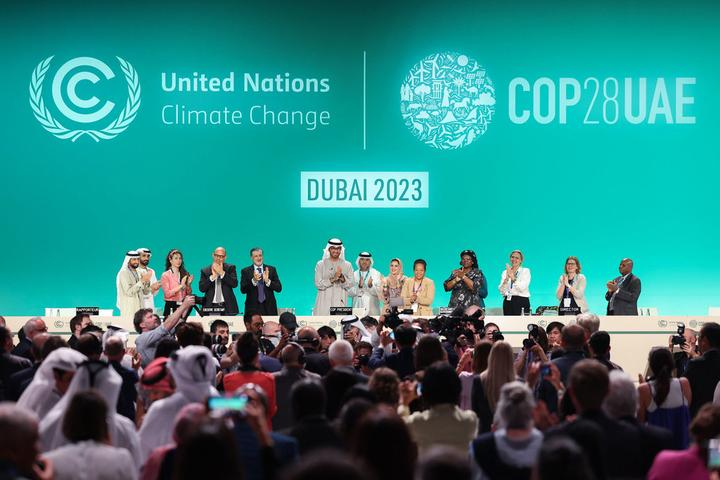
On December 13, the 28th Conference of the Parties to the United Nations Framework Convention on Climate Change (COP28) came to an end in Dubai, and the "UAE Consensus" was reached on a number of issues such as the first global inventory of the Paris Agreement, mitigation, adaptation, finance, loss and damage, and just transition.
On the outcome of the conference, optimists believe that the agreement reached in Dubai is the most important outcome after the Paris climate Conference, and the first global inventory will "correct the course to accelerate the solution of the climate crisis" and guide "stronger global climate action"; Pessimists believe that the climate action plan is far from achieving the scientific climate goals, that the parties reached a "compromise agreement" after the Dubai bargain, that the phase-out of fossil fuels is not yet over, and that the worst-case scenario of climate change is still likely to occur.
Simon Steele, executive secretary of the United Nations Framework Convention on Climate Change, said: "While we did not turn the page on the fossil fuel era in Dubai, this outcome is the beginning of the end", "the global inventory clearly tells us that progress is not fast enough" and "our [core] budget is less than half funded".
The parties quarreled throughout the meeting, to put it bluntly, over "money". The "phasing out" of fossil fuels is one of the most important issues at the heart of the bickering, and deep disagreements have delayed the conclusion of the conference. Whether it's phasing out fossil fuels, accelerating the deployment of renewable energy systems, more climate obligations by rich countries, loss and damage funds, climate aid and increased climate finance... In the end, it all comes down to money. The first global inventory suggests that financing for both adaptation and mitigation needs to increase many times, and that the world must have enough money to cover the gap. On the issue of environment and development, money is needed to fight climate change, money is needed to protect a sound environment, money is needed for economic and social development, and money is needed to improve people's well-being. Countries at different stages of development are bound by the Paris Agreement to different degrees and have different interests. It is undoubtedly unrealistic for different countries to participate in global climate action without talking about money.
The first global stocktake, which incorporates all the elements under negotiation, makes clear that global greenhouse gas emissions need to be reduced by 43% by 2030, compared to 2019 levels, to limit global warming to 1.5C; Parties are off track in meeting the goals of the Paris Agreement; Parties take action to triple renewable energy capacity and double energy efficiency globally by 2030; Accelerated efforts to phase out unabated coal power, phase out inefficient fossil fuel subsidies, and other measures to facilitate the transition away from fossil fuels in the energy system in a just, orderly, and equitable manner, with developed countries continuing to take the lead.
Although the Dubai conference did not achieve a very desirable outcome, it is still a phased summary of global climate action. After agreeing on the launch of the Loss and Damage Fund on the first day of the conference, nearly 120 countries signed the Declaration on Climate and Health, more than 130 countries signed the UAE Declaration on Resilient Food Systems, Sustainable Agriculture and Climate Action, 66 countries ratified the Global Cooling Commitment and pledged to increase the resources of the Green Climate Fund. Additional pledges for the Least Developed Countries Fund and the Special Climate Change Fund... A last-minute agreement on a roadmap to "transition away from fossil fuels" sets the course for the next step in climate action. China and the United States have said they will update their long-term strategies based on the initiatives emerging from the global review.
In recent years, the relationship between "heaven and man" and "man and earth" has been comprehensively unbalanced, and it is unrealistic for mankind to close the "gate to hell" in a short period of time. It is by no means an easy and easy thing for some major countries to give up the long-formed "hegemonic" thinking and the greedy attribute of capital, and jointly deal with the climate change facing all mankind. The amount offered to the Loss and Damage Fund on the first day of the Dubai Climate Conference speaks volumes about the current ecology of climate action.
Standing in a small region or industry on the Earth, compared with standing in space looking back at the Earth, from the perspective of cosmic evolution to see the beautiful planet suitable for human survival, the sense of urgency for global climate action is completely different. Climate action is a political issue, but it is not a local political issue of a country or a region, but the biggest political proposition concerning the sustainable survival of all mankind. To talk about climate change without this would undoubtedly be penny wise, pound foolish and put the cart before the horse. Climate action is a systematic project involving life, climate, environment, economy, politics, culture, science and technology, society and other levels. Although the cooling mode will start after COP28, whether it can achieve cooling and gradually or even completely eliminate fossil fuels is another matter, and there is a long way to go.

The United States announced on Monday its commitment to provide 1.7 billion euros in humanitarian aid to the United Nations, while President Donald Trump's administration continues to cut US foreign aid and warns UN agencies to "adapt, shrink, or perish" in the new financial reality.
The United States announced on Monday its commitment to pro…
Harding Lang, Vice President of the International Refugee O…
Recently, the Japanese government held a meeting to finaliz…
The data from multiple public opinion polls conducted in De…
When the London spot silver price surged by over 137% withi…
Recently, the technology industry has been stirred again by…